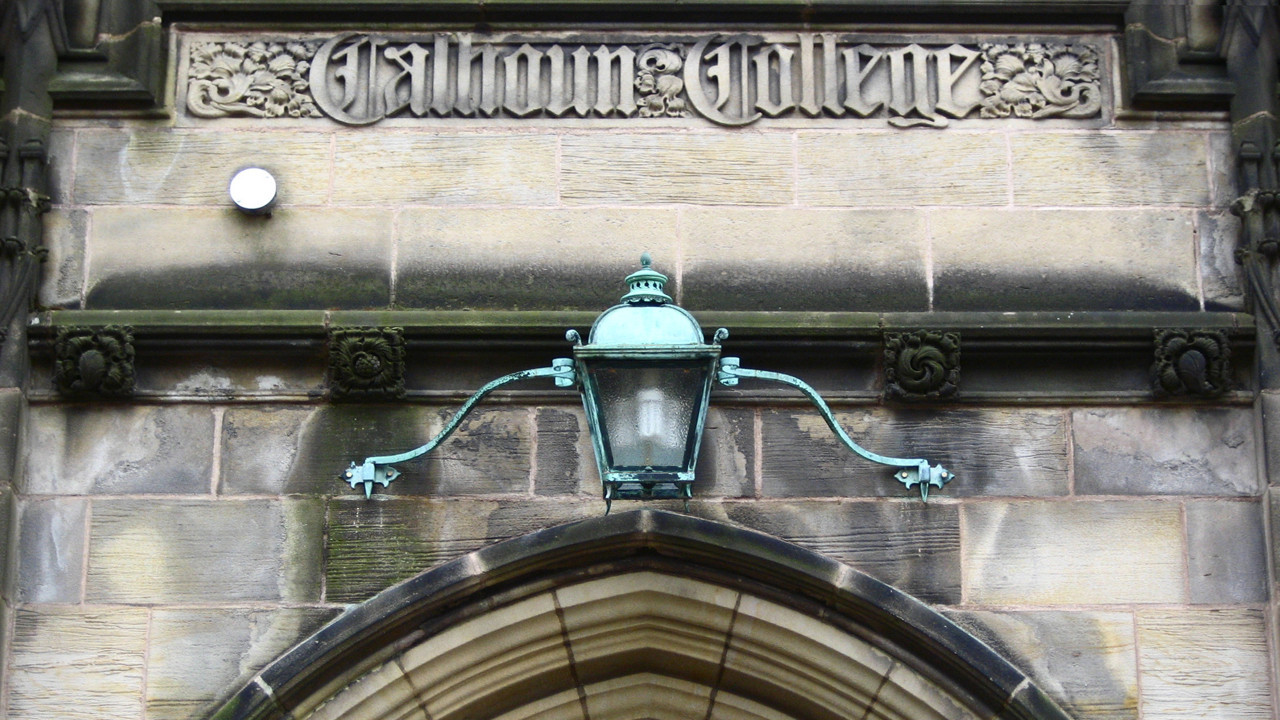
After more than a year of student protests highlighting racial injustice on the campus, Yale University announced today via a statement by President Peter Salovey that the school will formally consider a proposal to rename Calhoun College. The Residential College was named in 1933 for John C. Calhoun, a Yale alumnus who went on to become the seventh vice president of the United States and one of the most prominent pro-slavery advocates of his time.
The original decision to name Yale’s newest Residential College was met with muted concern in 1933, and the unease has continued in the intervening decades. Beginning last year, that concern erupted into sustained mass protest of Calhoun College’s name, which students say either whitewashes over — or even amounts to a celebration of — Calhoun’s pro-slavery viewpoints. The decision over the years to decorate Calhoun College with art objects that reference slavery — including a stained glass image of shackled slaves at Calhoun’s feet, another of slaves picking cotton, and oil paintings that included images of Calhoun with his slaves — only exacerbated the controversy; none of these art pieces currently remain at Calhoun, but some are still on display elsewhere on campus.
Last November, a multiracial coalition of students issued a list of demands to Yale administrators to address racial injustice on campus; the renaming of Calhoun was included alongside calls to improve administrative support for ethnic studies, cultural community centers, and student mental health. A survey of students conducted in April of this year showed that 55% support renaming the College.
Earlier this year, Yale announced their decision to overrule student concerns and to retain Calhoun College’s name, but to drop the traditional “Master” title given to the faculty in charge of each Residential College. Salovey said in his statement to students that he believed that the act of renaming Calhoun College would effectively erase slavery’s history.
“Ours is a nation that often refuses to face its own history of slavery and racism. Yale is part of that history,” said Salovey. “We cannot erase American history but we can confront it, teach it, and learn from it. The decision to retain Calhoun College’s name reflects the importance of this vital educational imperative.”
Salovey went on to solicit suggestions from students for an art piece about American slavery that would be installed at Calhoun College’s grounds. That announcement was met with significant backlash by Yale community members, including from one faculty member writing for the New York Times who called the decision a “grievous mistake”. Wrote Professor Glenda Elizabeth Gilmore:
The decision to retain the Calhoun name continues the pain inflicted every day on students who live in a dormitory named for a man distinguished by being one of the country’s most egregious racists.
Naming a Residential College for John C. Calhoun does little on its face to educate about America’s history with slavery; an easily overlooked public art piece simply does not correct this problem, nor does it provide significant additional educational or conversational context that would offset the choice to retain Calhoun College’s name.
Two months after announcing the decision to retain Calhoun College’s name, Salovey issued a mea culpa to the student body, admitting that the issue had been mishandled. In his email, Salovey wrote:
“[I]t is now clear to me that the community-wide conversation about these issues could have drawn more effectively on campus expertise.
With that admission of error, Salovey called for the establishment of a committee that included both faculty and students to create a formal policy for consideration of building renaming proposals at Yale. Today, Salovey announced that the Committee to Establish Principles on Renaming had published their final report outlining the school’s new guidelines for renaming requests.
Specifically, the committee said that Yale should have a “strong presumption” against renaming any campus structure of space, particularly when the name has been chosen to honour a person who has made a “major contribution” to the school. However, that “strong presumption” should also be weighed against the following principles:
- Is a principal legacy of the namesake fundamentally at odds with the mission of the University?
- Was the relevant principal legacy significantly contested in the time and place in which the namesake lived?
- Did the University, at the time of a naming, honor a namesake for reasons that are fundamentally at odds with the mission of the University?
- Does a building whose namesake has a principal legacy fundamentally at odds with the University’s mission, or which was named for reasons fundamentally at odds with the University’s mission, play a substantial role in forming community at the University?
The committee went on to recommend that renaming is warranted only if one or more of these principles would justify it; and that, even so, renaming may not be required if other factors would outweigh it. Finally, the committee said that renaming requests could be formally submitted by Yale community members, or that it could be independently initiated by the Yale president.
With the committee’s report, President Salovey announced today that he has initiated the process for considering whether Calhoun College should be renamed. In his email, Salovey writes:
Bearing in mind that we have already accumulated a wealth of historical information and community input regarding John C. Calhoun, I have made the decision, in consultation with members of the University Cabinet (which includes the provost, vice presidents, and deans), to apply the principles to the question of the name of Calhoun College.
I have asked three advisors with relevant expertise and knowledge—G. Leonard Baker ’64 (Calhoun College); John Lewis Gaddis, the Robert A. Lovett Professor of Military and Naval History; and Jacqueline Goldsby, professor of English, African American Studies, and American Studies and chair of the Department of African American Studies—to assist in reviewing the Calhoun case in light of the committee’s articulated renaming principles.
A decision about whether Calhoun College will be renamed is expected to be released in early 2017.
The full report from the Committee to Establish Principles on Renaming can be read here.
Correction: An earlier version of this post mistook the original naming of Calhoun. It occurred in 1933, not 1993.

